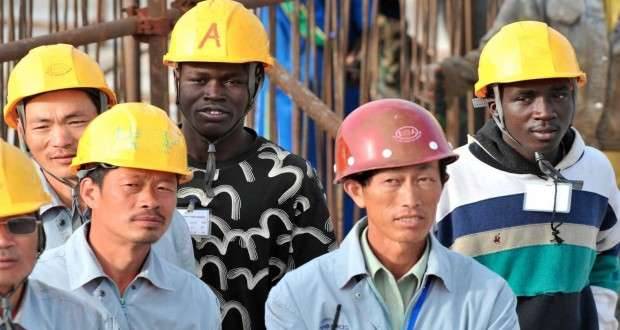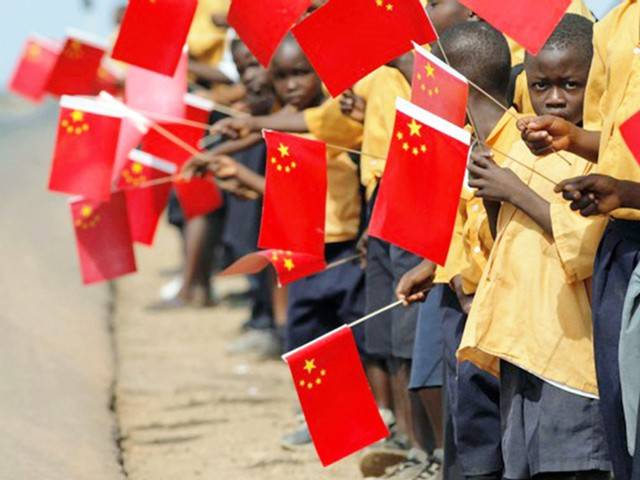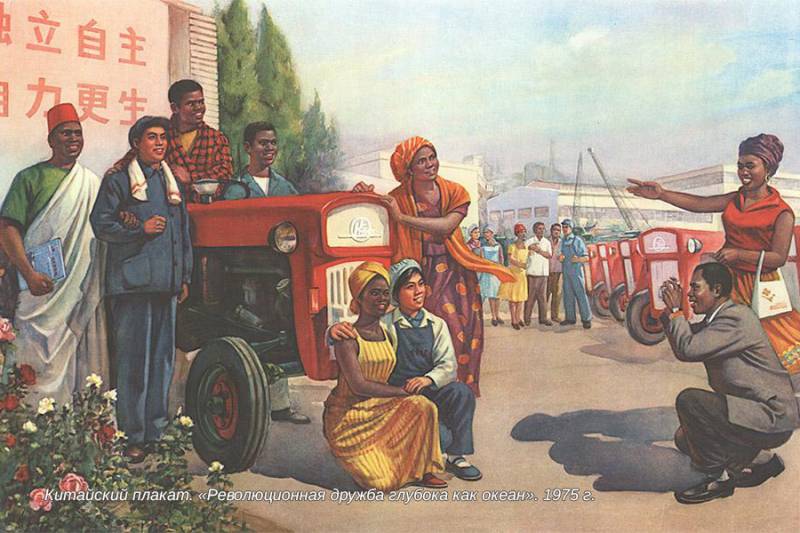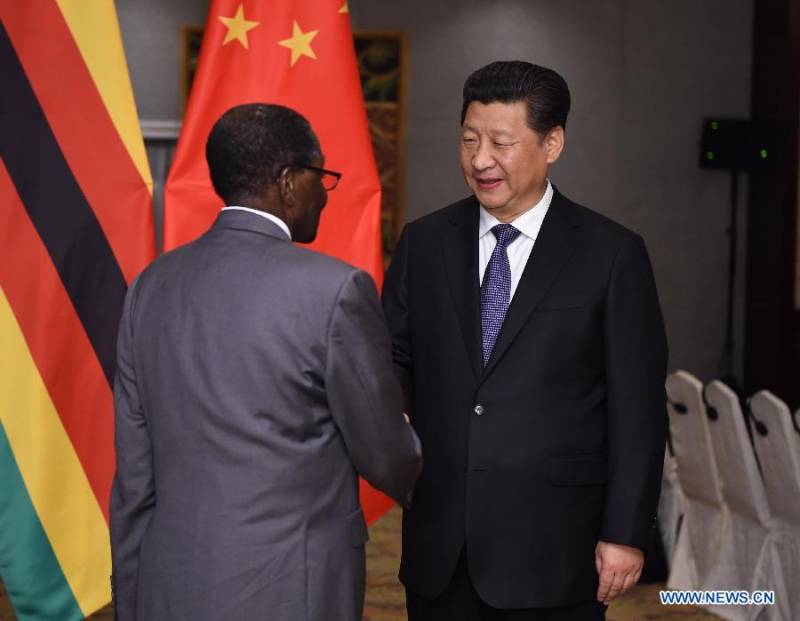Chinese footprint in Africa: China is crowding out the USA and Europe
China preferred to cooperate with a number of revolutionary regimes and movements in Tropical Africa. It is known that Maoism was sympathized, for example, by Jonash Savimbi, the leader of the UNITA rebel organization in Angola. Robert Mugabe in Zimbabwe, who also took on a number of Maoist concepts, also emphasized cooperation with China. Many other African leaders who saw him as a “third force” besides the USA and the USSR also flirted with China. For example, in Tanzania, where Julius Nyerere tried to build his own model of socialism, in the 1960s. Chinese military instructors trained partisans and military specialists for a number of rebel organizations and national armies of African states. Decades have passed, the Soviet Union collapsed, and economic competition has replaced the ideological confrontation in Africa. Now China is competing on the “Black Continent” with the United States and the European Union. I must say - competing very successfully.
By the end of the first decade of the 21st century, China has become a key investor in Africa. Moreover, the nature of Chinese investment indicates that it has already outgrown the framework of a centralized program. Now not only the state and large Chinese companies are investing in Africa, but also many medium and small companies. Even Chinese small businesses are increasingly manifesting themselves on the African continent. Small businessmen from China open small trading shops, massage parlors, and medical offices in Africa. These services are in demand, and as a market, the African continent is very promising. Today, Chinese investment in African economies amounts to tens of billions of dollars, and every year their turnover only grows. Even Chinese government experts cannot calculate the exact volume of Chinese investments in Africa today. The fact is that many entrepreneurs invest in bypassing the state, including through offshore zones. Therefore, it is possible that in reality the level of Chinese investment is even higher than the representatives of the PRC leadership themselves imagine.
Zimbabwe was one of the first African states to fall under the full political and economic influence of China. History Sino-Zimbabwean relations go back to the era of the Cold War and the confrontation between the great powers in Africa. When the partisan struggle of the national liberation movement of local peoples against the white leadership of the country launched a partisan struggle in the territory of modern Zimbabwe, then called Southern Rhodesia, the Soviet Union relied on the organization of the ZAPU — the Union of African People of Zimbabwe, headed by Joshua Nkomo. ZAPU relied on the support of the Ndebele people and mining workers, and was in more moderate positions.
In turn, another, more radical organization - ZANU - African National Union of Zimbabwe headed by Robert Mugabe - began to focus on China. In 1980, it was ZANU Robert Mugabe who came to power. Thus, a pro-China state appeared in Africa, initially obliged to the PRC for military and organizational support during the national liberation struggle. After Mugabe came to power, China received almost unlimited opportunities to participate in the economic life of Zimbabwe. Beijing allocated large financial loans to Harare, in gratitude for this Mugabe always supported any actions of the Chinese leadership in domestic and foreign policy. For example, when an anti-government demonstration was dispersed in China in 1989, Robert Mugabe officially supported the policies of the PRC and the Chinese Communist Party.
However, for a long time, close cooperation in the political sphere and the provision of loans were not accompanied by the development of economic relations between countries. The role of China in the Zimbabwean economy began to increase after the introduction of EU and IMF sanctions against the Mugabe government. In ten years, trade between China and Zimbabwe has grown from 197 million dollars to 1102 million dollars. China supplies Zimbabwe with industrial products of the most diverse nature, and Zimbabwe ships diamonds, steel, platinum and chrome to China. Chinese companies have long been mining for minerals in Zimbabwe, the Zimbabwean market is flooded with cheap Chinese goods. This causes a mixed reaction of local residents who do not like the fact that “white farmers” are replaced by Chinese merchants as the shadow owners of the country. However, Zimbabwe has nowhere to go - now the country's economy is already tightly tied to cooperation with China. China remains one of the few states that cooperate with Zimbabwe militarily. As is known, China continues to supply weapons for the armed forces of Zimbabwe.
Meanwhile, China does not allow itself and excessive generosity with respect to the Zimbabwean regime. Unlike the Soviet leadership, who loved luxurious gifts to African “ideological close ones” regimes, China in 2014 demanded Zimbabwe to immediately repay the debt in the amount of 180 million dollars. Otherwise, Beijing threatened to stop further lending to the Mugabe regime. The Zimbabwean leadership has no choice but to raise funds to pay off the debt - after all, China doesn’t like to joke, and Harare was well aware that Beijing, if China’s economic interests require it, will not stop financing Zimbabwe, even though Robert Mugabe’s ideological commitment to their chinese partners.
By the way, in the event of a change in the political regime in Zimbabwe (and Mugabe is already over ninety - and the coming to power of a new leader is only a matter of time), China will retain its political and economic influence in this country with almost one hundred percent guarantee. For Beijing, the main thing is to preserve its economic position in the country, so the Chinese leadership, if necessary, will calmly establish a dialogue with the forces that will replace the current Zimbabwean leadership.
Despite the special nature of Sino-Zimbabwean relations, Zimbabwe today is not included in the list of African countries leading in attracting Chinese investment. The state of the Zimbabwean economy, to put it mildly, is far from ideal - the sanctions and the numerous mistakes of the government affected. China, in turn, is interested not so much in ideologically as in economically promising countries. In the first decade of the 21st century, the most developed economic relations were formed by China with South Africa, Nigeria, Algeria, Sudan, and Zambia. In the middle of 2000's. these countries accounted for up to 70% of Chinese investment in African economies. Unlike the United States and European countries, which indicated their economic presence in Africa, primarily humanitarian aid, China immediately focused on investment. Europe and the United States sent humanitarian aid, and China invested in the construction of industrial enterprises, the development of trade and agriculture. Thus, Chinese economic policy turned out to be more effective, because it made African states dependent on investments. Unlike ultimate humanitarian aid, investment has clear perspectives and is useful for African countries themselves. Therefore, the attitude of African governments towards Chinese investment is more serious and thorough.

China, unlike the United States and the European Union, is not afraid to invest in the most risky projects in the most problematic African countries - and because of this, it also wins rather than loses. For example, in recent years, China’s cooperation with Nigeria is gaining further momentum. It is one of the largest countries in the African continent. But, despite the relatively higher level of development compared to other countries, Nigeria also has many problems, including infrastructural ones. The construction of railways and highways, power stations, and oil refineries, which China has in Nigeria, have a productive impact on the development of the Nigerian economy.
On the other hand, China is actively investing in the construction and modernization of mining enterprises in northern Nigeria. As you know, the northern states are a very problematic region. When the British colony was still in Nigeria, the authorities did not pay enough attention to its development. In fact, medieval feudal relations were mothballed here, there were traditional Emirates and the Sokotan Sultanate, which had independence in internal matters. The industry in the north of Nigeria practically did not develop. Now there is a very high level of religious fundamentalism. This is aggravated by such social problems as high birth rates with very high unemployment. The youth of the region simply have nowhere to work, and the emergence of Chinese companies building mining enterprises immediately solves a number of problems in the region. Therefore, the country's leadership constantly emphasizes that relations with China are of great importance for Nigeria.
China has long-standing ties with Zambia. In the era of the Cold War, China also showed political activity in this country, and today Chinese-Zambian cooperation has shifted to the economic plane. Zambia is interested in China, first of all, as one of the largest suppliers of copper, cobalt, nickel. China is the world's largest consumer of copper, so relations with Zambia, where large copper mines operate, are of fundamental importance for Beijing. In February 2007, the first free economic zone of China was opened in Zambia - in Chambishi. Thirteen Chinese companies are located on the territory of the Chambishi economic zone. In 2009, China opened a subzone in Lusaka, the capital of Zambia. Here, Chinese companies produce clothing, household appliances, electronics, and tobacco products.
Following Zambia, China created a number of free economic zones on the African continent. Thus, in 2009, the creation of the Jinfei economic zone on the island of Mauritius began, specializing in the textile industry and high technologies. In the same year, the Ogun zone project was launched in Nigeria, focused on the production of building materials, various computer and medical equipment, and food. The economic zone Oriental in Ethiopia is focused on steel production, electrical engineering. The Lekki zone in Nigeria was created for the production of transport equipment, textiles, home appliances, and the Suez zone in Egypt for the production of gasoline equipment, electrical appliances, textiles and automobiles.
China considers Africa, first of all, as the richest source of natural resources. For Beijing, the African continent in this regard is more of an interest than Russia. For example, African countries rank second after the oil monarchies of the Middle East for oil supplies to China. Angola is the most important supplier of oil to China, slightly smaller volumes are from Congo and South Sudan, followed by Nigeria and a number of other countries.

Claiming its influence in Africa, China acts not only by economic methods. In recent years, the scale of cultural cooperation between China and many African countries has increased. Chinese has long been studied in universities and colleges in many African countries, it is considered as very promising, so many young Africans prefer to learn Chinese, rather than English or French as before. Chinese cultural influence is very noticeable in the countries of Eastern and Southern Africa, primarily in Kenya. In the capital of Kenya, Nairobi, Chinese media are located. Numerous Chinese diasporas live in East Africa, numbering more than half a million people. They are also unconditional vehicles for Chinese cultural influence.
The military-political presence of the PRC in Africa is gradually increasing. If China had previously refrained from sending its troops to Africa, in the middle of the 2000s. Chinese peacekeepers have emerged in a number of African hot spots. In 2015, China signed a ten-year contract for the construction of a naval base in Djibouti. This will be the first military base of the People’s Liberation Army of China outside the PRC. Apparently, the emergence of a base in Djibouti is due to China’s need to protect the transportation of oil and other important natural resources from Africa and the Middle East.
China's activity in Africa does not go unnoticed by the United States. In many ways, it was she who led Washington to the creation of the African Command of the US Armed Forces (AFRICOM) in 2008, which, however, is based mainly in Germany and Italy. Although formally the command was created to counter terrorism and insurgents in the Sahara-Sahel region and in the Niger delta, in fact, everyone understands that its appearance was largely due to rivalry with China. True, the US has already lost economic competition in Africa: the volume of Chinese investment is several times greater than that of the US.


Information